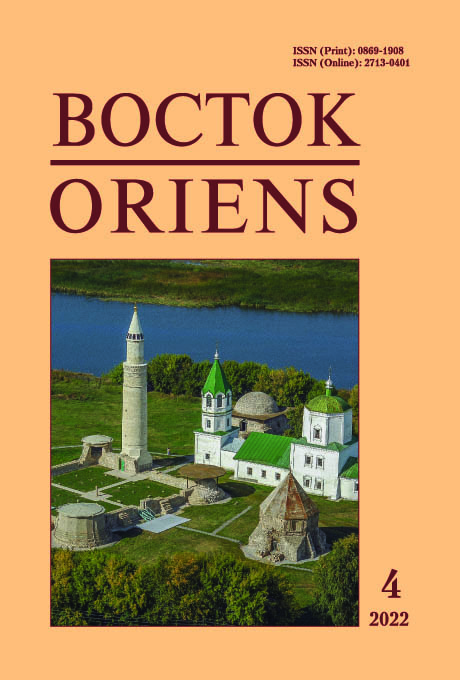| On a "dead end" in the Egyptian predynastic studies, and on a possible direction of the way out |
Dmitry Proussakov
|
Pages 6-17 |
| “I gave grain to my city”: on the issue of food donations in the VIth Upper Egyptian nome in the First Intermediate Period |
Arkadiy Demidchik
|
Pages 18-28 |
| The Calendar Festivals of the Middle Kingdom Period in the Beni Hasan Tomb Paintings and Inscriptions |
Alexandra Mironova
|
Pages 29-42 |
| On the "ethno-classe dominante" in the First Persian Period Egypt |
Denis Izosimov
|
Pages 43-54 |
| Loom weights from archaeological excavations in Memphis: some considerations on dating of vertical loom in Egypt |
Victoria I. Yarmolovich
/
Olga V. Orfinskaya
|
Pages 55-64 |
| Ibn Fadlan’s Report on the Rus, Gog and Magog in Light of Recent Work on the Mashhad Miscellany |
Jonathan Shepard
|
Pages 65-74 |
| The Decline and Fall of Khazaria – Might or Money? |
Alex Feldman
|
Pages 75-84 |
| The Role of Trade in the Conversion to Islam and in the History of the Volga Bulghars |
István Zimonyi
|
Pages 85-94 |
| Volga Bulgaria on the Map of Ibn Hawqal |
Irina Konovalova
|
Pages 95-104 |
| The Significance of al-Biruni’s Stories about the Volga Bulgaria |
Tatyana Kalinina
|
Pages 105-113 |
| Muslim sources on the connections of Khorezm, Desht-i Qipchak and the Volga region in the XII century |
Dmitriy Timokhin
|
Pages 114-124 |
| Cultural and Literary Ties of Khorezm and the Volga Region in the 19th – Beginning of the 20th cс. (on the Example of the Manuscript Collections of the Southern Aral Sea Region) |
Tatiana Anikeeva
|
Pages 125-131 |
| Pokrovsky's project on the Caucasus as a characteristic document of Russian military and political thought in the early 1830s. |
Vadim Mukhanov
|
Pages 132-144 |
| Israeli Policy on Immigrants' Housing in the 1950s: Problems and Contradictions |
Roman Romanenko
|
Pages 145-155 |
| The Heirs to the Saudi Throne: Emir Faisal and Emir Muhammad |
Alexander I. Yakovlev
|
Pages 156-167 |
| Libya: To what Cities Do the Tribes Go? |
Vasily A. Kuznetsov
|
Pages 168-181 |
| Qatar and Taliban in the Context of Changing Situation in Afganistan |
Elena S. Melkumyan
|
Pages 182-193 |
| Inscription No. 494 from the Temple of Toutuo as Prototype of the Inscription on the “Nestorian Monument” from Xi’an, 781 (Preliminary Notes) |
Dinara V. Dubrovskaya
|
Pages 194-199 |
| The Early Estampages of the Tonyukuk Inscription Identified in the Collection of Central Asia and Siberia of the IOM, RAS |
Anna A. Turanskaya
|
Pages 200-209 |
| The problem of the use of the term “Portuguese Aljamía” |
Oxana Tikhonova
/
Maria Mazniak
|
Pages 210-218 |
| Japanese Episode from The Life of Heinrich Schliemann: On The Bicentennial Anniversary |
Tatiana Gavrilina
/
Darya Ivanova
/
Andrey Tabarev
|
Pages 219-229 |
| Findings of Seleucid and Ptolemaic coins in Dagestan and the Problem of the Caspian Waterway |
Archil S. Balakhvantsev
/
Murtazali S. Gadjiev
|
Pages 230-240 |
| A Letter of the Mamluk Sultan Concerning Trade Contacts with Yemen |
Milana Iliushina
|
Pages 241-254 |
| Mossaki N. [Review of:] Rediscovering Kurdistan’s Cultures and Identities: The Call of the Cricket. Joanna Bocheńska (ed.). London, Palgrave Macmillan, 2018, 343 pp. ISBN: 978-3-319-93087-9 |
Nodar Mossaki
|
Pages 255-260 |
| [Review of:] Ivan Minayev Sketches of Ceylon and India. From the Travel Notes of a Russian. Tr. By Narayan Prasad. Chennai: Notion Press, 2020, 576 р. |
Zagorodnikova Tatyana
|
Pages 261-263 |
| In Memory of Mikhail S. MEIER (30.08.1936–19.04.2022) |
Svetlana Kirillina
/
Pavel Shlykov
/
Vyacheslav Shlykov
|
Pages 264-267 |
| About Grigory Grigorievich Kosach |
Vasily A. Kuznetsov
|
Pages 268-272 |

